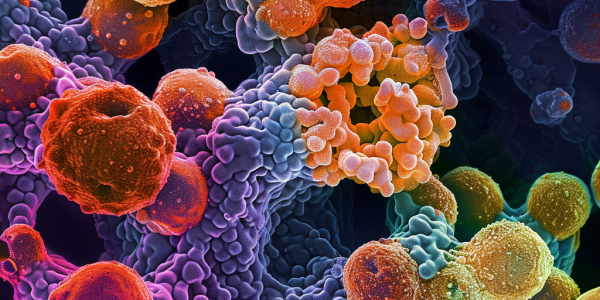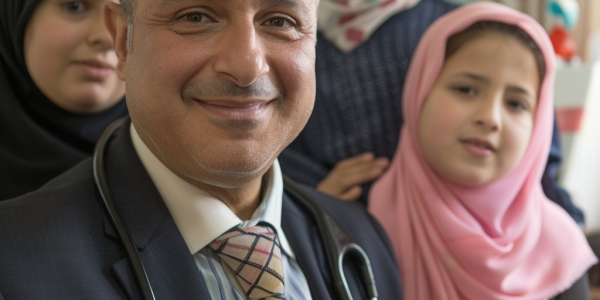Revolutionary Blood Test Predicts Breast Cancer Recurrence with 100% Accuracy
Learn about the groundbreaking new blood test that can predict breast cancer recurrence with 100% accuracy, offering hope for early detection and treatment. Stay informed on the latest healthcare advancements to protect yourself and your loved ones from the risks of breast cancer.
Study Shows Female Cancer Survivors at Low Risk of Obstetric Complications
Female cancer survivors found to have low risk of obstetric complications, according to a study by Universities of Birmingham, Bristol, and Edinburgh. Research funded by Children with Cancer UK, Brain Tumour Charity, and Academy of Medical Sciences. Study in Lancet Oncology highlights lower risk of complications in most cancer survivors during pregnancy. Recommendations include formal guidelines to support cancer survivors during pregnancy.
Exercise Reduces Nerve Damage from Chemotherapy, Study Finds
A recent study by researchers from the University of Basel and the German Sport University Cologne found that physical exercise can significantly reduce nerve damage during chemotherapy treatments. Patients who engaged in exercise alongside their chemotherapy experienced a 50 to 70 percent reduction in nerve damage, leading to improved quality of life and lower mortality rates. Integrating simple exercises into cancer treatment regimens may help mitigate side effects and enhance post-treatment recovery for patients.
Study Reveals Hidden Complexities in Liver Cancer Tumors
A recent study funded by the National Research Foundation Singapore revealed unexpected molecular heterogeneity within liver tumors, with more than 40% of hepatocellular carcinomas containing multiple molecular subtypes. Published in the Journal of Hepatology, the findings emphasize the importance of comprehensive sampling in studying and treating liver cancer to optimize patient outcomes. The ‘bad apple effect’ underscores the need for personalized treatment strategies to address the complexities of liver cancer and improve clinical outcomes.
Study Shows IMRT Superior to 3D-CRT for Lung Cancer Treatment
Learn how intensity-modulated radiation therapy (IMRT) can benefit patients with non-small cell lung cancer (NSCLC) compared to 3D-conformal radiation therapy (3D-CRT). A recent study from The University of Texas MD Anderson Cancer Centre highlights the accuracy and reduced adverse effects of IMRT, recommending its standard use for locally advanced, unresectable NSCLC. Lead author Stephen Chun, M.D., emphasizes the significance of IMRT in improving treatment outcomes for patients with lung cancer.
New CAR T-Cell Therapy Offers Hope to Lymphoma Patients
Learn about the promising new CAR T-Cell therapy offering hope to lymphoma patients who have not responded to traditional treatments. Discover how this innovative therapy is providing a potential cure for individuals like John Bell, who faced an aggressive form of lymphatic system cancer and found new hope through this groundbreaking treatment.
Groundbreaking Nano-Immunotherapy Developed for Lung Cancer Treatment
Researchers at Brigham and Women’s Hospital have developed a groundbreaking nano-immunotherapy for lung cancer that delivers anticancer drugs directly to cancer cells and boosts the immune system’s ability to combat the disease. This innovative approach targets multiple proteins on cancer cells, enhancing the immune response and minimizing side effects. Published in Science Advances, this new therapy offers hope for patients with non-small cell lung cancer who have not responded to traditional treatments.
Rising Rates of Colorectal Cancer Among Younger Adults Cause Concern
Colorectal cancer rates have been rising among individuals under 50, while declining in older age groups. Younger individuals are often diagnosed at later stages, posing challenges to treatment. Factors contributing to this trend include environmental factors and obesity. Maintaining a healthy diet and regular exercise can help mitigate the risk of colorectal cancer. Research shows that a diet rich in fruits, vegetables, fiber, and low in processed meats and alcohol can reduce the risk of developing colorectal cancer.
Rising Trend of Young Patients Battling Incurable Colon Cancer
Oncologist Dr. Raed Al-Rajabi reveals the heartbreaking reality of treating young patients with incurable colon cancer, with a shocking 70 percent reaching critical stages due to delayed diagnosis. The alarming increase in colorectal cancer cases among individuals under 55 has nearly doubled, emphasizing the importance of early detection for improved survival rates.
Recent Updates from CROWN Trial: Lorlatinib in Treatment-Naïve Patients with Advanced ALK+ NSCLC
Learn about the recent updates from the CROWN trial on lorlatinib in treatment-naïve patients with advanced ALK+ NSCLC. Expert perspectives from The Oncology Brothers and Joshua K. Sabari, MD, shed light on the efficacy of lorlatinib and its potential as a groundbreaking treatment option for this specific patient population. Discover the promising outcomes and favorable response rates observed, emphasizing the importance of early intervention with lorlatinib in managing advanced ALK+ NSCLC.










